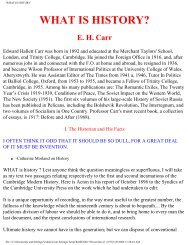The bronze age and the Celtic world - Universal History Library
The bronze age and the Celtic world - Universal History Library
The bronze age and the Celtic world - Universal History Library
Create successful ePaper yourself
Turn your PDF publications into a flip-book with our unique Google optimized e-Paper software.
FS AND Q'S 145<br />
that <strong>the</strong> C in <strong>the</strong> Goidelic, which represents an earher Q or Qu, is replaced in Brythonic<br />
by a P or perhaps a B. Thus <strong>the</strong> <strong>Celtic</strong> langu<strong>age</strong>s fall into two well-defined groups which<br />
may be called <strong>the</strong> Q <strong>and</strong> P dialects.<br />
Rhys pointed out, too, that in <strong>the</strong> ItaUan peninsula <strong>the</strong> same phenomenon appeared.<br />
In Latin, <strong>and</strong> <strong>the</strong> dialects most closely allied to it, Q or Qu was found, while in <strong>the</strong> Urabrian<br />
forms of speech, used over <strong>the</strong> greater part of <strong>the</strong> peninsula this sound was replaced by<br />
P. Thus thore were Q <strong>and</strong> P dialects in Italy also.<br />
He fur<strong>the</strong>r pointed out that <strong>the</strong> Greek langu<strong>age</strong>, with certain exceptions, was a<br />
true P dialect, for <strong>the</strong> Latin equus corresponded to <strong>the</strong> Greek iinrhi. He suggested, however,<br />
that <strong>the</strong> Ionic dialect used by Herodotus <strong>and</strong> Hippocrates, which frequently had a k<br />
where <strong>the</strong> st<strong>and</strong>ard Greek had a w,^ was a descendant of a form of Q speech, but that<br />
<strong>the</strong> Qu had degenerated into k, as it had into C in Goidelic.<br />
Fur<strong>the</strong>r, he pointed out that <strong>the</strong> Q dialects, GoideUc, Latin <strong>and</strong> Ionic Greek, formed<br />
so to speak an outer ring, while Brythonic, Umbrian <strong>and</strong> st<strong>and</strong>ard Greek lay within <strong>the</strong>m.<br />
He argued from this that <strong>the</strong>se tongues had spread in two waves from a common centre,<br />
which he fixed in <strong>the</strong> mountain zone of Central Europe, <strong>and</strong> <strong>the</strong>nce <strong>the</strong> Q tongues had<br />
spread by invasion, to be followed some few centuries later by a second invasion of<br />
P people, who had driven <strong>the</strong> Q people fur<strong>the</strong>r from <strong>the</strong> original home.<br />
He suggested that <strong>the</strong> change of Q into P had been effected by a conquering<br />
group of aliens, who had adopted <strong>the</strong> Wiro tongue from <strong>the</strong>ir subjects, but retained some<br />
details of <strong>the</strong> phonological laws of <strong>the</strong>ir original langu<strong>age</strong>, which accounted for this<br />
labialisation. He fur<strong>the</strong>r suggested that <strong>the</strong>se ahen invaders were <strong>the</strong> Alpine<br />
inhabitants of <strong>the</strong> Swiss lake-dwellings.^<br />
This paper was received with hostile criticism <strong>and</strong> derision, especially by some<br />
German students of <strong>Celtic</strong> tongues.* It had little better reception in France, <strong>and</strong> <strong>the</strong><br />
British <strong>and</strong> Irish <strong>Celtic</strong> scholars, with a few exceptions, treated <strong>the</strong> idea with contempt.<br />
<strong>The</strong> <strong>the</strong>ory has never received <strong>the</strong> consideration <strong>and</strong> fair criticism which a paper from<br />
so eminent an authority on <strong>Celtic</strong> langu<strong>age</strong>s deserved.<br />
<strong>The</strong> main facts as to <strong>the</strong> <strong>Celtic</strong> <strong>and</strong> Itahc dialects are not in dispute. <strong>The</strong>re can be<br />
no question that in both of those areas both Q <strong>and</strong> P groups are or were in existence,<br />
' Rhys (1894) 119. ' Zimmer (1912); Meyer (1895-6) 55-86.<br />
7 Rhys (1894) 122, 130.<br />
10







